|
|
|
Sort Order |
|
|
|
Items / Page
|
|
|
|
|
|
|
| Srl | Item |
| 1 |
ID:
160885
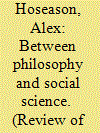

|
|
|
|
|
| Summary/Abstract |
As a discipline, IR returns repeatedly to the ‘problem of harm’; debating what harm is or should mean. Exploring the discipline through this lens allows us to understand it as contributing to a broader process of negotiation centred on harm as a principle of restraint. However, existing accounts of what harm means for IR are challenged by the scale and visibility of large-scale harm. This article attempts to push beyond recent accounts of harm by Linklater and Mitchell by examining their respective framings of the relationship between harm and its explanation in IR. Building on their limitations, I propose a framework centred on arguments for ontological realism and structure as a focus for explanation. The resulting ontology sustains the concerns of both while: (a) more fully characterising the relationship between explanation and values in IR; and (b) providing a more adequate account of the role of abstraction. In developing upon existing accounts, this article seeks to provide a stronger ground for the analysis of harm in IR. More broadly, it contributes to contemporary debates centred on the relationship between ontology and values with a view to clarifying the nature of explanation in IR as a social science.
|
|
|
|
|
|
|
|
|
|
|
|
|
|
|
|
| 2 |
ID:
127015


|
|
|
|
|
| Publication |
2013.
|
| Summary/Abstract |
This in-depth conversation with Professor Andrew Linklater engages with his academic biography, his intellectual contribution to the field of International Relations (IR) and his reflections on the current state of, and challenges facing, the discipline of (IR). It thereby traces his biography from his undergraduate days in Aberdeen, via his first lectureships in Australia, back to the United Kingdom and eventually to Aberystwyth University; it engages with his main oeuvres from the 1982 book Men and Citizens in the Theory of International Relations to his most recent work on The Problem of Harm in World Politics, and covers the development of IR as a global discipline from the 1970s until today.
|
|
|
|
|
|
|
|
|
|
|
|
|
|
|
|
| 3 |
ID:
183947
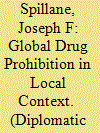

|
|
|
|
|
| Summary/Abstract |
Cairo’s Qasr El Aini Hospital regularly received opiate addicts in poor health, but a startling new development in April 1929 captured the attention of Dr. Alexander Gordon Biggam, Director of the Medical Unit. Patients with a history of injecting heroin were being admitted with high fevers, and diagnored with falciparum malaria. Shocked by the prevalence of the disease, which appeared confined to networks of injection drug users, Dr. Biggam hypothesized—correctly—that the disease was being spread through contamined blood in shared syringes. “If the theory of the production of this malignant malarial infection amongst the heroin addicts is correct,” he concluded, “we are faced with a problem of considerable importance to the inhabitants of Cairo.”1 In the winter of 1932, a similar novel outbreak of malaria among injecting heroin users occupied Dr. Guy Henry Faget, an Assistant Surgeon at the United States Marine Hospital in New Orleans, a facility serving primarily merchant seamen. “If the hypodermic syringe must be accepted as a means of conveying malaria among narcotic addicts,” Dr. Faget warned, “then a new chapter in the epidemiology of this disease has been opened.
|
|
|
|
|
|
|
|
|
|
|
|
|
|
|
|
| 4 |
ID:
178923
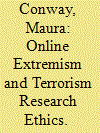

|
|
|
|
|
| Summary/Abstract |
This article reflects on two core issues of human subjects’ research ethics and how they play out for online extremism and terrorism researchers. Medical research ethics, on which social science research ethics are based, centers the protection of research subjects, but what of the protection of researchers? Greater attention to researcher safety, including online security and privacy and mental and emotional wellbeing, is called for herein. Researching hostile or dangerous communities does not, on the other hand, exempt us from our responsibilities to protect our research subjects, which is generally ensured via informed consent. This is complicated in data-intensive research settings, especially with the former type of communities, however. Also grappled with in this article therefore are the pros and cons of waived consent and deception and the allied issue of prevention of harm to subjects in online extremism and terrorism research. The best path forward it is argued—besides talking through the diversity of ethical issues arising in online extremism and terrorism research and committing our thinking and decision-making around them to paper to a much greater extent than we have done to-date—may be development of ethics guidelines tailored to our sub-field.
|
|
|
|
|
|
|
|
|
|
|
|
|
|
|
|
| 5 |
ID:
157725
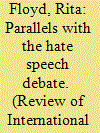

|
|
|
|
|
| Summary/Abstract |
This article argues that public expressions of Islamophobia are best understood as securitising requests (that is, calls on powerful figures/bodies to treat an issue in security mode so that extraordinary measures can be used to combat it), especially in those cases where Muslims are feared and disliked because of the perception that Islamic people are prone to terrorism. This article argues that harmful and derogatory securitising requests targeting racial, ethnic, or religious minorities are on par with hate speech and it highlights the fact that many contemporary societies are now seeking legal protections against such security speech (expressed most notably in the desire to ban Islamophobia). It is from this perspective that this article poses an important research question: With a view to protecting those adversely affected, are legal protections against harmful and offensive securitising requests justified? The research question can be answered by drawing parallels to the existing hate speech debate in legal and political theory. The research reveals that, although the case against legal protections of harmful and defamatory security speech is ultimately more convincing, security speech alone can be so damaging that it should be informed by a number of ethical considerations. This article goes on to suggest three criteria for governing the ethics of requesting securitisation. As such this article fills a lacuna in the ‘positive/negative debate’ on the ethics of security that has engaged with securitisation, but that has failed to consider the ethics of speaking security.
|
|
|
|
|
|
|
|
|
|
|
|
|
|
|
|
| 6 |
ID:
085572
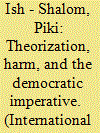

|
|
|
|
|
| Publication |
2008.
|
| Summary/Abstract |
The migration of democratic-peace theory from academia to the American political arena resulted in misrepresenting the theory politically. Both the form and content of the political misrepresentation are different from those of the theory. It is argued here that rather, than the theory itself, it is its political misrepresentation that influenced public deliberation and the recent American efforts to democratize the Middle East. Thus, the inputs of theorizing the democratic peace are shown to cause political harms and policy mishaps. Identifying the harms, the mishaps and the theoreticians' indirect responsibilities for them, I conclude that theoreticians are ascribed with political responsibility ensuing in a democratic imperative to show greater concern and involvement in the political destinies of their theories and to participate more actively in the public deliberations that shape policies
|
|
|
|
|
|
|
|
|
|
|
|
|
|
|
|
| 7 |
ID:
141201
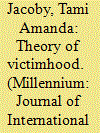

|
|
|
|
|
| Summary/Abstract |
What (and who) is a victim? In contemporary violent conflicts, the construction of grievance-based identity is a fundamentally contested process as the lines between victim and perpetrator are blurred by ongoing cycles of belligerence and retribution. As victims are incorporated into broader political campaigns, it becomes nearly impossible to separate the victim from the politics. The ubiquity of victims in international politics is a serious challenge to International Relations theory as categories of victim and perpetrator are generally treated as ‘prior or external to analysis’ instead of as propositions for further inquiry. This article formulates a political theory of victimhood driven by a distinction between victimisation as an act of harm perpetrated against a person or group, and victimhood as a form of collective identity based on that harm. It proposes a sequence of five stages that victims experience from the act of victimisation to the recognition of victim-based identity: (1) structural conduciveness, (2) political consciousness, (3) ideological concurrence, (4) political mobilisation and (5) political recognition. The article explores the stages with concrete examples and offers three main challenges for future research. First, as an identity, victimhood is more prominent in societies that recognise justice. Second, victimhood accompanies struggles for recognition. Third, victim rivalries obfuscate straightforward analysis of victimhood in conflict zones.
|
|
|
|
|
|
|
|
|
|
|
|
|
|
|
|
| 8 |
ID:
193486
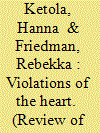

|
|
|
|
|
| Summary/Abstract |
This article examines ‘parental harm’ – a harm that occurs when a parent loses or faces the threat of losing a child. We contend that the manipulation and severing of relationships between parents and children has played a central role in war and oppression across historical contexts. Parental harm has long-term and pervasive effects and results in complex legacies for carers and their communities. Despite its grave impact, there is little research within International Relations into parental harm and understanding of its effects. We conceptualise parental harm through two frames – the ‘harm of separation’ and ‘harm to the ability to parent’ – and theorise gendered dimensions of how it is perpetuated and experienced. As such, we advance feminist understandings of family as a gendered institution that shapes the conduct of war and institutionalises racialised oppression. Our conception of parental harm offers novel insights into the relationship between intimate relations, the family, and state power and practices. We illustrate our conceptual arguments through two examples: the control and manipulation of family in antebellum slavery in the United States and the targeting of Tamil children in disappearances in Sri Lanka. These examples demonstrate the pervasiveness of parental harm across contexts and forms of violence.
|
|
|
|
|
|
|
|
|
|
|
|
|
|
|
|
|
|
|
|
|